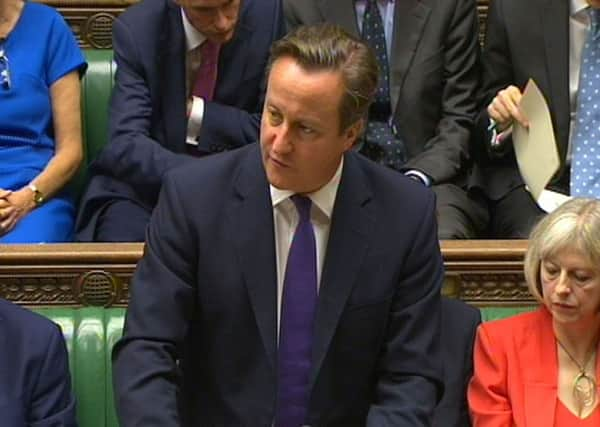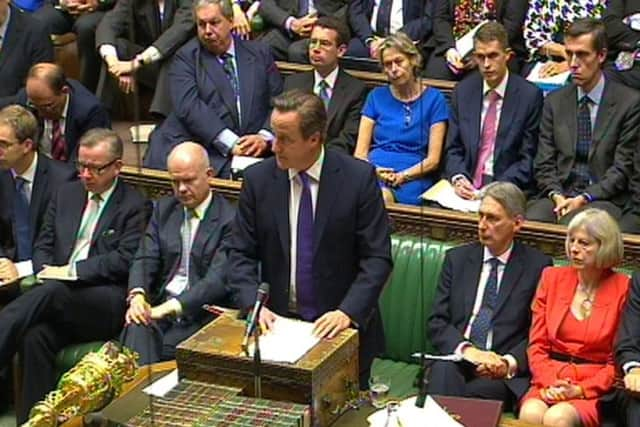RAF scrambles for air strikes after green light from MPs


At the end of of a six-and-half hour Commons debate, MPs voted by 524 to 43 - a majority of 481 - to endorse attacks on the militants in Iraq in support of the United States-led coalition, with Labour backing the Government motion.
Six Yorkshire MPs voted against air strikes- George Galloway, Austin Mitchell, Linda Riordan, Barry Sheerman, Mike Wood and George Mudie.
Advertisement
Hide AdAdvertisement
Hide AdThe vote clears the way for RAF Tornado GR4 fighter bombers stationed in Cyprus to begin combat operations as soon as suitable targets are identified.


Labour MP Rushanara Ali dramatically resigned from the party’s front bench in order to abstain in the vote.
Opening the debate, Prime Minister David Cameron told MPs - meeting in emergency session - that Britain had a “duty” to join the military campaign as IS posed a direct threat to the country.
But despite the overwhelming majority in favour of military action, there were concerns on all sides of the House that - 11 years after the invasion of Iraq - Britain was again embarking on military action in the Middle East.
Advertisement
Hide AdAdvertisement
Hide AdAt the same time, there was criticism from both Conservative and Labour MPs that UK air strikes were being restricted to Iraq and that IS targets in Syria - the movement’s birthplace - were excluded.
Mr Cameron said the motion had been limited to Iraq in order to secure cross-party consensus and avoid a repeat of last year’s damaging Commons defeat when Labour combined with Tory and Liberal Democrat rebels to block air strikes against the Syrian regime of President Bashar Assad.
However Defence Secretary Michael Fallon later indicated that the Government may well eventually have to come back to the House again to seek support for extending air strikes into Syria.
“Isil is based in Syria, that’s where its headquarters are, that’s where its resources, its people are. To deal with Isil you do have to deal and defeat them in both Iraq and in Syria,” he told BBC Radio 4’s The World at One.
Advertisement
Hide AdAdvertisement
Hide Ad“We are taking this in a calm, measured way, step by step, but it is clear to us that obviously Isil, in the end, has to be tackled on a broader front.”
The timing of the first RAF bombing raids will depend upon when suitable targets can be identified. The United States has been carrying out air strikes in northern Iraq since mid-August and most of the obvious targets have already been hit.
The strikes are expected to be conducted by the six Tornado GR4s which have been based at RAF Akrotiri on Cyprus since last month where they have been deployed in a reconnaissance role.
Opening the debate, Mr Cameron told MPs Britain should not entirely “subcontract” to other countries’ air forces the task of defeating an organisation which had murdered a British hostage and plotted terror attacks against the UK.
Advertisement
Hide AdAdvertisement
Hide Ad“This is not a threat on the far side of the world,” he said.
“Left unchecked, we will face a terrorist caliphate on the shores of the Mediterranean, bordering a Nato member, with a declared and proven determination to attack our country and our people.
“This is not the stuff of fantasy - it is happening in front of us and we need to face up to it.”
Warning of a lengthy engagement, he said it would be a mission that would take “not just months but years”.
Advertisement
Hide AdAdvertisement
Hide Ad“The hallmarks of this campaign will be patience and persistence, not shock and awe,” he said.
Labour leader Ed Miliband, who lost frontbencher Rushanara Ali who resigned in order to abstain in the vote, agreed that the UK “cannot simply stand by” but reiterated his view that any move to extend air strikes into Syria should be supported by a United Nations Security Council resolution.
“In my view, when we are not talking about being invited in by a democratic state it would be better - I put it no higher than that - it would be better to seek a UN Security Council resolution,” he said.
However he was criticised by some Labour MPs. Former minister Pat McFadden said: “Why is it right to come to the aid of the victims of Isis who are living under a democracy in Iraq but not those who are living under a dictatorship in Syria?”
Advertisement
Hide AdAdvertisement
Hide AdIn the Lords, Labour former defence secretary Lord Hutton of Furness said the Government would inevitably have to re-think its position of Syria, and do “whatever is necessary” to destroy IS.
“We shouldn’t rule out the deployment, if necessary, of UK ground forces to support our allies in the region,” he said.
“I hope it doesn’t come to that. But I think it would be a very great mistake to signal to our enemy in advance the limits we are prepared to place now on the sort of support we might be prepared to give to our allies.”
Tory rebel John Baron, who voted against the motion, warned that air strikes alone would not defeat IS and could prove counter-productive.
Advertisement
Hide AdAdvertisement
Hide Ad“We should have learned from previous interventions that just kicking the door down and walking away is not the right policy,” he said.
Foreign Secretary Philip Hammond said the lives of British hostages were already at “extreme risk” from IS and the decision to back air strikes would not increase the jeopardy they were in.
He told BBC Radio 4’s PM: “The honest answer is that they were already at extreme risk. We know this is an organisation we cannot reason with, that shows no compassion, no mercy from the way they have acted in the past.
“I don’t believe the hostages will be at any more risk today as a result of this decision than they were yesterday.
Advertisement
Hide AdAdvertisement
Hide Ad“I’m afraid, because of the nature of the organisation we are dealing with, the hostages are in extreme danger.”
Setting out the next steps, he said work would begin to identify targets for Tornado jets and “other assets in the region” to strike.
He said: “We have already got assets in the region, Tornados have been flying reconnaissance missions out of Cyprus over Iraq for some time now, they can of course deliver air strikes.
“So we will now be looking at the intelligence picture, talking with allies, identifying appropriate targets for the first British strikes.
Advertisement
Hide AdAdvertisement
Hide Ad“But we are not going to give, for obvious security reasons, a running commentary on the identification of those targets. Once the first strikes have been carried out we will make an announcement to that effect.”
Mr Hammond said he did not expect the RAF to face significant resistance from IS forces on the ground.
“We would not expect our aircraft to encounter any significant resistance from Isil but there are always risks in any combat mission,” he said.
He denied a suggestion by former Cabinet minister Ken Clarke that the UK’s contribution was “almost symbolic”.
Advertisement
Hide AdAdvertisement
Hide AdMr Hammond said: “We have high-precision weapons on those Tornado aircraft but we also have other assets in the region.”
The precisely-targeted weapons would help avoid civilian casualties although that was “not always achievable”, he added.
“The objective is zero civilian casualties and zero collateral damage. That’s not always achievable but I would say this: if there’s an air force in the world that can get as close to that target as possible it’s the RAF.”